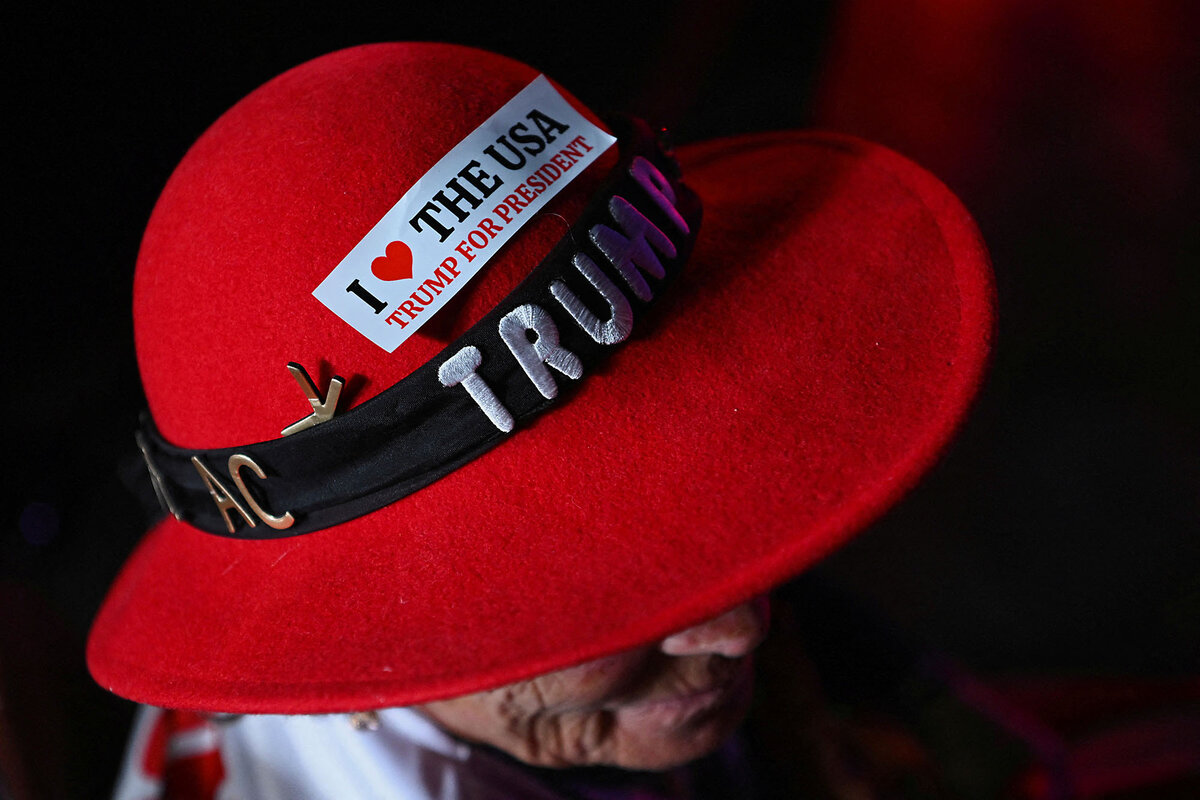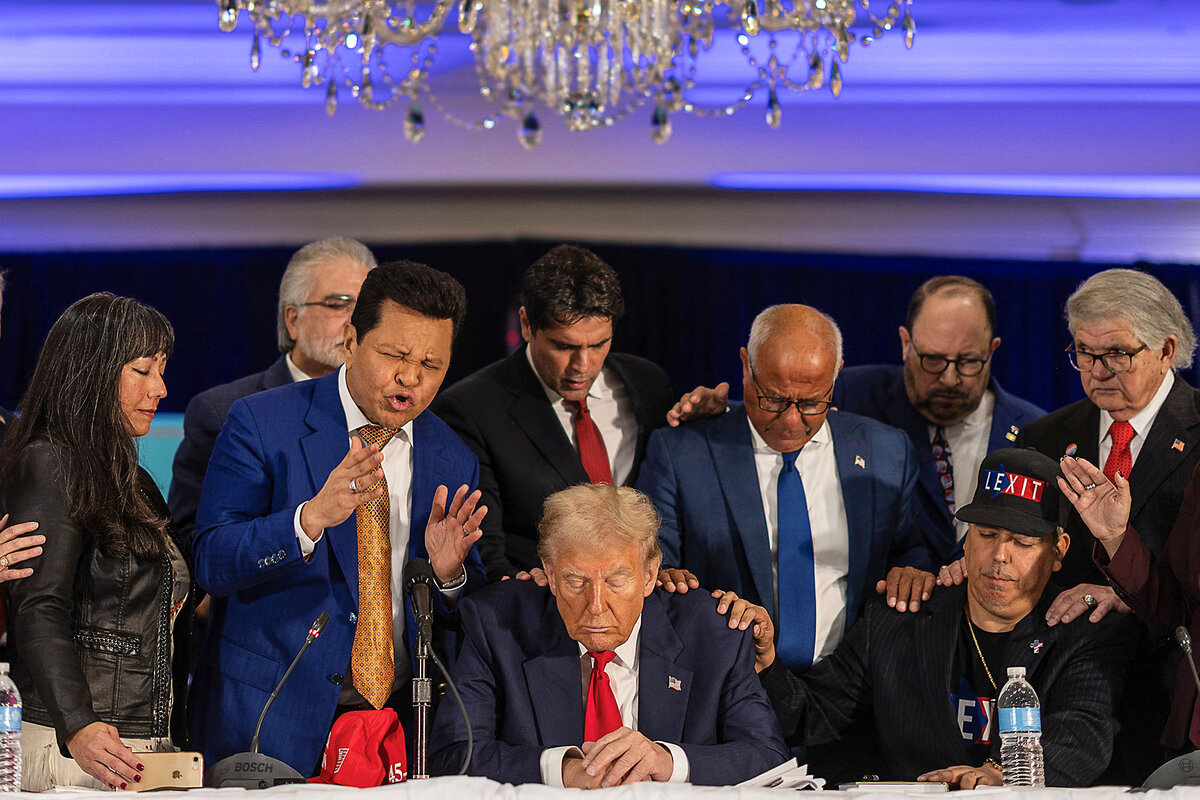Former President Donald Trump’s win reflected many voters’ frustration with issues from border security to the cost of living to America’s role in the world, and is part of a larger anti-incumbent backlash seen in other Western democracies.

Why is Christian Science in our name?
Our name is about honesty. The Monitor is owned by The Christian Science Church, and we’ve always been transparent about that.
The Church publishes the Monitor because it sees good journalism as vital to progress in the world. Since 1908, we’ve aimed “to injure no man, but to bless all mankind,” as our founder, Mary Baker Eddy, put it.
Here, you’ll find award-winning journalism not driven by commercial influences – a news organization that takes seriously its mission to uplift the world by seeking solutions and finding reasons for credible hope.
Explore values journalism About usMonitor Daily Podcast
- Follow us:
- Apple Podcasts
- Spotify
- RSS Feed
- Download
 Amelia Newcomb
Amelia Newcomb
Today we start digging into the meaning of a historic election, one that in many ways marks the culmination of Donald Trump’s decisive realignment of the Republican Party and his regnant place in American politics. Given the sweeping results, we’ve devoted this issue of the Daily entirely to election stories, from the influence of Latino men in the results to what our reporter found at an election watch party with people who are watching extremely closely: Ukrainians.
Already a subscriber? Log in
Help fund Monitor journalism for $11/ month
Monitor journalism changes lives because we open that too-small box that most people think they live in. We believe news can and should expand a sense of identity and possibility beyond narrow conventional expectations.
Our work isn't possible without your support.
Today’s stories
And why we wrote them
( 7 min. read )
Today’s news briefs
• No tracking of migrants: Australia’s highest court ruled that migrants can’t be forced by law to wear electronic tracking bracelets or to comply with curfews.
• Europe eyes Trump presidency: Dozens of leaders will be assessing the new global outlook during a one-day summit Thursday in Hungary.
• Serbs seek accountability: Thousands marched to demand the resignations of top officials following the deadly collapse of a concrete roof at the main railway station in Novi Sad, Serbia, during renovations seen as compromised by corruption.
• Migrant smuggling: A French court has found 18 defendants guilty in a trial linked to bringing people across the perilous English Channel route from France to the United Kingdom.
( 4 min. read )
Donald Trump’s victory was aided by a significant rise in Latino support, according to exit polls. Some voters shifted loyalties due to concerns over the economy and inflation.
( 4 min. read )
Voters have put the U.S. Senate back under Republican control. One upshot: They will hold the keys to approving nominees for executive branch posts, federal judgeships, and the Supreme Court.
( 6 min. read )
Many Ukrainians who have followed the U.S. presidential contest almost as if it were their own nervously expressed the sense that their country’s future hung in the balance of an election in which they had no say.
The Monitor's View
( 2 min. read )
America’s presidential elections are a great survey of public opinion as well as a call to action. Yet while Donald Trump won both the popular vote and the Electoral College on Nov. 5, it could be that the exit polls will drive the course of his second term.
The theme of those polls? Americans seek a restoration of past norms of balance or harmony – balance in the economy for Trump supporters and, for those who voted for Kamala Harris, harmony in democratic norms.
Among the third of voters who identified the economy as their primary concern, 79% chose Mr. Trump, according to Edison Research’s exit polls. More specifically, 73% who see inflation as a severe hardship voted for the Republican candidate. They want to bring prices back to prepandemic levels and lower their higher cost of living.
For those who chose Ms. Harris, a majority are worried far more about the state of democracy than about the economy. They seek the civility and rule of law that were more common before Mr. Trump’s first term.
The president-elect thanked “the American people” for his victory and added, “We’re going to help our country heal.” That sentiment, if followed, would be a step toward those desires for balance and harmony.
That rare upbeat and unifying message pointed to another aspect of the exit polls: About 6 in 10 voters say the country’s best days are ahead.
In 11 key states, inflation dominated the concerns of voters. While the rate of price increases is now low – about 2% – the persistence of high prices from gasoline to housing drove many people to vote for the GOP candidate. Credit card debt, for example, was at a historic high in August as inflated prices have pushed people to charge more when buying everyday items.
“With inflation and two wars raging abroad, many voters fondly recalled a pre-pandemic world that was mostly at peace and economically prosperous under Trump,” wrote journalist Michael Hirsh in Foreign Policy.
Many economists say Mr. Trump’s proposed policies, such as tariffs on imported goods, could increase inflation. The exit polls offer the opportunity to temper his agenda and acknowledge the desire of nearly half the voters to restore democratic norms. Merely offering to help the country heal was a first step.
A Christian Science Perspective
Each weekday, the Monitor includes one clearly labeled religious article offering spiritual insight on contemporary issues, including the news. The publication – in its various forms – is produced for anyone who cares about the progress of the human endeavor around the world and seeks news reported with compassion, intelligence, and an essentially constructive lens. For many, that caring has religious roots. For many, it does not. The Monitor has always embraced both audiences. The Monitor is owned by a church – The First Church of Christ, Scientist, in Boston – whose founder was concerned with both the state of the world and the quality of available news.
( 3 min. read )
As we come to understand God as the one true Mind, we discover more of our dominion over distractions and of our innate ability to focus.
Viewfinder

A look ahead
Thanks for reading the Monitor today. We have a bonus read for you from Charlotte, North Carolina, on what it looks like when the voting process goes well.







